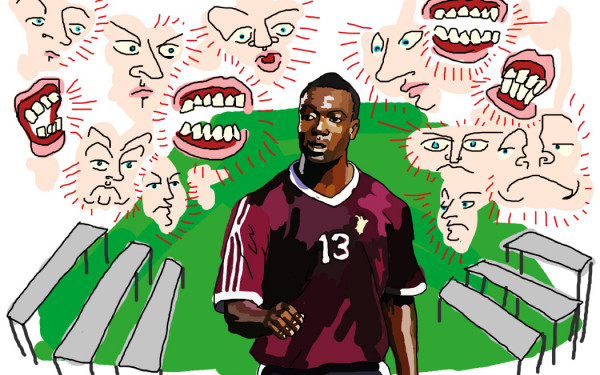Joëlle Békhazi Looks to Put Past Heartbreak Behind Her
Team Canada Attacker Reminisces on her Past and the Road to World Championships
Joëlle Békhazi’s introduction to water polo started in a rather unorthodox fashion. She was thrown into the sport—literally.
“I remember the first time she actually got into the pool to play water polo, she was actually thrown into the pool. She didn’t want to play,” said Békhazi’s mother, Diane Keus.
After being tossed into the pool, she immediately became attached to the sport. “Water polo was, I guess, my natural feel,” Békhazi said.
Békhazi, who has been involved in the sport since the age of ten, eventually found herself playing for the Dollard-des-Ormeaux Water Polo Club. Looking back, she remembered her first few practices, where she wasted no time impressing her coaches.
“I just remember there was this one moment […] I got a bad pass—I’m a righty, so I caught it with my left hand and I transmitted it to my right and my two coaches were like ‘Whoa, she’s going to be good,’” she said.
Békhazi found herself excelling at the sport. Eventually, at 16 years old, she would earn her first call to the Canadian Junior National Team. Békhazi would be a mainstay for Canada in the years to come. Now, at 29 years old, the attacker is still a key component for the national team.
“Of course you’re proud,” said Keus. “You’re proud of all the work she’s put in it and she’s there representing Canada.”
“We as parents followed her everywhere, wherever she went. To be there to watch your daughter play it’s pretty amazing.”
Throughout her career, Békhazi has been successful. She has won Youth National Championships in 2004 and 2005, as well as Junior National Championships in 2006 and 2007. Békhazi would also go on to win at the senior level three times in 2004, 2007 and 2010.
Not only did Békhazi prosper at the national level, she was an integral player under Jovan Vavic’s University of Southern California Trojans water polo team.
“Joelle was always the leader of our team, she was always very committed,” said Vavic. “She was very reliable and she went out of her way to help others.”
During USC’s title winning season in 2010, Békhazi—who was studying biological sciences at the time—was the leading scorer for her team, notching 56 goals in 26 games. USC went on to win the NCAA championship in San Diego against Stanford University. She was the first Canadian to do so.
2_701_1050_90.jpg)
“Technically, [Békhazi] was very versatile and was able to do more than one thing. She was an excellent passer, an excellent finisher and also a very good defender,” said Vavic. “She just hated to lose, she did whatever was necessary for the team to be the best it can be.”
Despite the several honours Békhazi has achieved over her career, there is one moment that continues to linger in her thoughts.
It was at the finals of the 2011 Pan American Games in Guadalajara, Mexico. Team Canada faced off against the United States in a game that led to the longest shootout in water polo history—a Guinness World Record. A win for Canada not only meant gold, but also Olympic Qualification.
Going into the fourth quarter, with a spot in the Olympics within reach, Canada found itself up 7-4, but the United States had other plans. The game went on to finish 8-8. After a scoreless overtime, shootouts would be the deciding factor.
“It ended up being four rounds of shootouts, and after the first round it’s sudden death,” said Békhazi.
With the shootouts still tied, Békhazi found herself as the last shooter. If she converted her chance, Olympic qualification was still up for grabs. Unfortunately, this wasn’t the case. The United States would go on to win the shootout 27-26.
“Everybody was crying. There’s nothing to say,” said Keus. “They had worked so, so hard and again, the Americans beat them. It was a heartbreaking moment.”
Canada would have a second chance at the world qualifier, but would unfortunately lose to Russia.
“I was going to retire after that,” she said. But for Békhazi, the thought of letting go was something she couldn’t seem to grip.
“After that game I saw my parents and it’s like tears couldn’t come yet because my body was just saying, ‘Water Polo, I’m not done with it.’”
Békhazi would stay true to those words. She still finds herself a mainstay on Canada’s roster and with the upcoming World Championships in Budapest, Hungary this July, she will look to put past woes behind her.
“I want to continue improving and playing to the best of my ability through the season and play some really great water polo at Worlds,” she said. “It may be my last, therefore I want to end with a great note.”
With the prospect of this summer’s tournament being her last, Békhazi is already planning her future, post-water polo.
Having finished her Master’s at McGill in physiology, Békhazi is now enrolled at the Collège d’Études Ostéopathiques studying osteopathy. Her plans following her water polo career will be to open up her own clinic, she said.
With Békhazi’s eyes on the forthcoming World Championships, she’s not only hoping to go out on a positive note, but she’s looking to help develop the sport overall.
“It’s something I love so much. I want to help it and help make it be something bigger in Canada,” Békhazi said. “I think it’s just the fact that I can’t let it go.”

1_900_600_90.jpg)
_600_832_s.png)

4_600_375_90_s_c1.jpg)

_600_375_90_s_c1.jpg)
_600_375_90_s_c1.jpg)